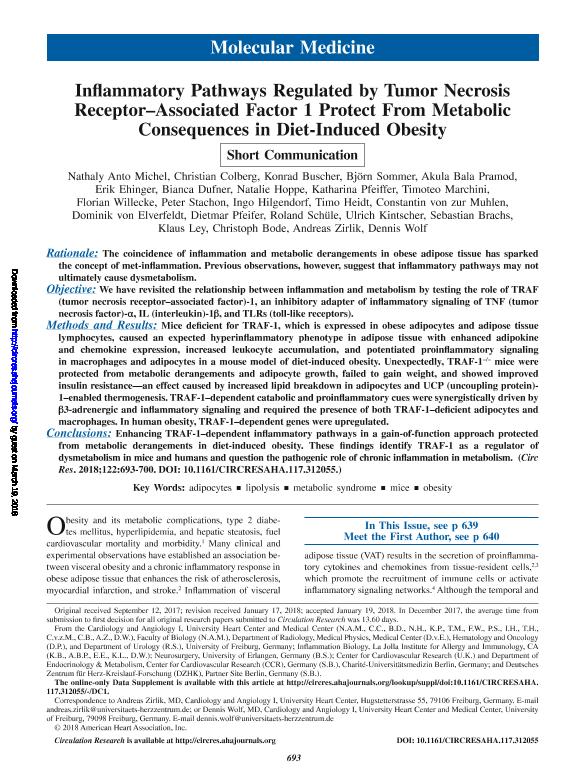Artículo
Inflammatory pathways regulated by tumor necrosis receptor-associated factor 1 protect from metabolic consequences in diet-induced obesity
Michel, Nathaly Anto; Colberg, Christian; Buscher, Konrad; Sommer, Björn; Pramod, Akula Bala; Ehinger, Erik; Dufner, Bianca; Hoppe, Natalie; Pfeiffer, Katharina; Marchini, Timoteo Oscar ; Willecke, Florian; Stachon, Peter; Hilgendorf, Ingo; Heidt, Timo; Von Zur Muhlen, Constantin; Von Elverfeldt, Dominik; Pfeifer, Dietmar; Schüle, Roland; Kintscher, Ulrich; Brachs, Sebastian; Ley, Klaus; Bode, Christoph; Zirlik, Andreas; Wolf, Dennis
; Willecke, Florian; Stachon, Peter; Hilgendorf, Ingo; Heidt, Timo; Von Zur Muhlen, Constantin; Von Elverfeldt, Dominik; Pfeifer, Dietmar; Schüle, Roland; Kintscher, Ulrich; Brachs, Sebastian; Ley, Klaus; Bode, Christoph; Zirlik, Andreas; Wolf, Dennis
 ; Willecke, Florian; Stachon, Peter; Hilgendorf, Ingo; Heidt, Timo; Von Zur Muhlen, Constantin; Von Elverfeldt, Dominik; Pfeifer, Dietmar; Schüle, Roland; Kintscher, Ulrich; Brachs, Sebastian; Ley, Klaus; Bode, Christoph; Zirlik, Andreas; Wolf, Dennis
; Willecke, Florian; Stachon, Peter; Hilgendorf, Ingo; Heidt, Timo; Von Zur Muhlen, Constantin; Von Elverfeldt, Dominik; Pfeifer, Dietmar; Schüle, Roland; Kintscher, Ulrich; Brachs, Sebastian; Ley, Klaus; Bode, Christoph; Zirlik, Andreas; Wolf, Dennis
Fecha de publicación:
03/2018
Editorial:
Lippincott Williams
Revista:
Circulation Research
ISSN:
0009-7330
Idioma:
Inglés
Tipo de recurso:
Artículo publicado
Clasificación temática:
Resumen
Rationale: The coincidence of inflammation and metabolic derangements in obese adipose tissue has sparked the concept of met-inflammation. Previous observations, however, suggest that inflammatory pathways may not ultimately cause dysmetabolism. Objective: We have revisited the relationship between inflammation and metabolism by testing the role of TRAF (tumor necrosis receptor-associated factor)-1, an inhibitory adapter of inflammatory signaling of TNF (tumor necrosis factor)-a, IL (interleukin)-1ß, and TLRs (toll-like receptors). Methods and Results: Mice defcient for TRAF-1, which is expressed in obese adipocytes and adipose tissue lymphocytes, caused an expected hyperinflammatory phenotype in adipose tissue with enhanced adipokine and chemokine expression, increased leukocyte accumulation, and potentiated proinflammatory signaling in macrophages and adipocytes in a mouse model of diet-induced obesity. Unexpectedly, TRAF-1-/-mice were protected from metabolic derangements and adipocyte growth, failed to gain weight, and showed improved insulin resistance-an effect caused by increased lipid breakdown in adipocytes and UCP (uncoupling protein)-1-enabled thermogenesis. TRAF-1-dependent catabolic and proinflammatory cues were synergistically driven by ß3-adrenergic and inflammatory signaling and required the presence of both TRAF-1-defcient adipocytes and macrophages. In human obesity, TRAF-1-dependent genes were upregulated. Conclusions: Enhancing TRAF-1-dependent inflammatory pathways in a gain-of-function approach protected from metabolic derangements in diet-induced obesity. These fndings identify TRAF-1 as a regulator of dysmetabolism in mice and humans and question the pathogenic role of chronic inflammation in metabolism.
Palabras clave:
ADIPOCYTES
,
LIPOLYSIS
,
METABOLIC SYNDROME
,
MICE
,
OBESITY
Archivos asociados
Licencia
Identificadores
Colecciones
Articulos(IBIMOL)
Articulos de INSTITUTO DE BIOQUIMICA Y MEDICINA MOLECULAR
Articulos de INSTITUTO DE BIOQUIMICA Y MEDICINA MOLECULAR
Citación
Michel, Nathaly Anto; Colberg, Christian; Buscher, Konrad; Sommer, Björn; Pramod, Akula Bala; et al.; Inflammatory pathways regulated by tumor necrosis receptor-associated factor 1 protect from metabolic consequences in diet-induced obesity; Lippincott Williams; Circulation Research; 122; 5; 3-2018; 693-700
Compartir
Altmétricas



